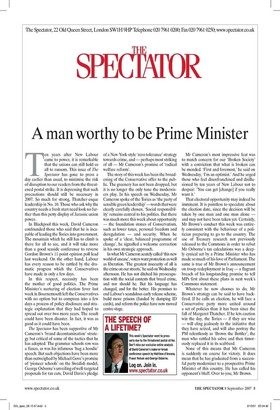A man worthy to be Prime Minister
Ten years after New Labour came to power, it is remarkable that the unions can still hold us all to ransom. This issue of The Spectator has gone to press a day earlier than usual, to minimise the risk of disruption to our readers from the threatened postal strike. It is depressing that such precautions should still be necessary in 2007. So much for strong, Thatcher-esque leadership in No. 10. Those who ask why the country needs a fresh start need look no further than this petty display of Jurassic union power.
In Blackpool this week, David Cameron confounded those who said that he is incapable of leading the Tories into government. The mountain which he still has to climb is there for all to see, and it will take more than a good seaside conference to reverse Gordon Brown's 11-point opinion poll lead last weekend. On the other hand, Labour has every reason to be rattled by the dramatic progress which the Conservatives have made in only a few days.
In this respect, necessity has been the mother of good politics. The Prime Minister's nurturing of election fever last week in Bournemouth left the Conservatives with no option but to compress into a few days a process of policy disclosure and strategic explanation that they had hoped to spread out over two more years. The result could have been disaster. In fact, it was as good as it could have been.
The Spectator has been supportive of Mr Cameron's 'brand decontamination' strategy but critical of some of the tactics that he has adopted. The grammar schools row was a fiasco, as was his infamous 'hug a hoodie' speech. But such objections have been more than outweighed by Michael Gove's promise of 'pioneer schools' on the Swedish model, George Osborne's unveiling of well-targeted proposals for tax cuts, David Davis's pledge of a New York-style 'zero tolerance' strategy towards crime, and — perhaps most striking of all — Mr Cameron's promise of 'radical welfare reform'.
The story of this week has been the broadening of the Conservative offer to the public. The greenery has not been dropped, but it is no longer the only tune the modernisers play. In his speech on Wednesday, Mr Cameron spoke of the Tories as `the party of sensible green leadership' —words that were clearly carefully chosen. 'Social responsibility' remains central to his politics. But there was much more this week about opportunity — the foundation stones of Conservatism, such as lower taxes, personal freedom and deregulation — and security. When he spoke of a 'clear, balanced programme of change', he signalled a welcome correction in his own strategic approach.
In what Mr Cameron acutely called `this new world of unease', voters want protection as well as liberation. 'The greatest insecurity of all is the crime on our streets,' he said on Wednesday afternoon. He has not ditched his preoccupation with the social contexts that breed crime, and nor should he. But his language has changed, and for the better. His promises to end Labour's scandalous early release scheme, build more prisons (funded by dumping ID cards), and reform the police have now moved centre-stage.
Mr Cameron's most impressive feat was to match concern for our 'Broken Society' with a conviction that what is broken can be mended. 'First and foremost,' he said on Wednesday, 'I'm an optimist.' And he urged those who feel disenfranchised and disillusioned by ten years of New Labour not to despair: 'You can get [change] if you really want it.'
That electoral opportunity may indeed be imminent. It is pointless to speculate about the election date, since the decision will be taken by one man and one man alone — and may not have been taken yet. Certainly, Mr Brown's conduct this week was entirely consistent with the behaviour of a politician preparing to go to the country. The use of Treasury research not previously released to the Commons in order to rebut Mr Osborne's tax calculations was a deeply cynical act by a Prime Minister who has made so much of his love of Parliament. The same is true of Mr Brown's announcement on troop redeployment in Iraq — a flagrant breach of his longstanding promise to tell MPs first about these plans in next week's Commons statement.
Whatever he now chooses to do, Mr Brown's strategy can be said to have backfired. If he calls an election, he will face a Conservative party more united around a set of policies than it has been since the fall of Margaret Thatcher. If he lets caution win the day, the Tories — if they are wise — will cling jealously to the initiative that they have seized, and will also portray the PM relentlessly as 'Brown the Bottler', the man who rattled his sabre and then timorously replaced it in its scabbard.
None of this means that Mr Cameron is suddenly on course for victory. It does mean that he has graduated from a successful party moderniser to a prospective Prime Minister of this country. He has called his opponent's bluff. Over to you, Mr Brown.





























































 Previous page
Previous page